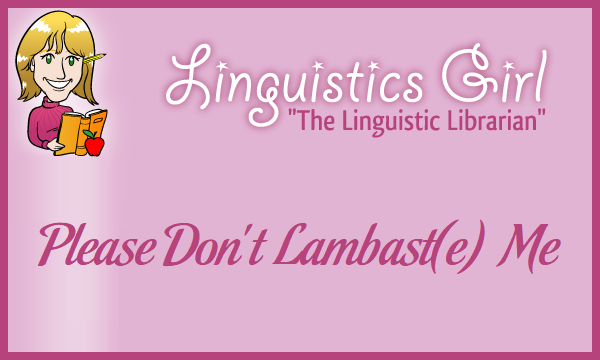I love all forms of word play. Before Easter, I heard a local news reporter pronounce the word <lambasted> “to criticize harshly, to assault violently” as /læmbeɪstɪd/, with the second syllable of the word pronounced like <baste> (rhymes with <waste>). I figured that he had had a slip of the tongue, which happens. No big deal. The timing for a “basting your Easter lamb” joke seemed apropos. I noticed the word only because the pronunciation seemed jarring to me. I pronounce the word as /læmbæstɪd/, with the second syllable pronounced like <bast> (rhymes with <fast>). After tweeting the joke, I did not give the word a second thought.
I just heard a news reporter pronounce <lambasted> as /læmbeɪstɪd/, with the second half of the word pronounced like <baste>.
We are close to Easter, so some of us are basting our lambs, but I think he meant /læmbæst/! ?
— Linguistics Girl MLS MS (@LinguisticsGirl) April 18, 2019
Until two weeks later when I posted another tweet about the word <doryphore> from The Dictionary of Difficult Words by Jane Solomon: “When it comes to #grammar, don’t be a doryphore ‘someone who is annoying because they like to point when others make small mistakes.'” Another tweeter asked if my <lambaste> tweet qualified. I still thought my “basting a lamb” joke was hilarious. Then another tweeter informed me that my “wrong” pronunciation is the pronunciation he grew up with and is still used to.
When it comes to #grammar, don’t be a doryphore “someone who is annoying because they like to point when others make small mistakes.” @janesolomon pic.twitter.com/acru7rnNKT
— Linguistics Girl MLS MS (@LinguisticsGirl) April 27, 2019
Astonished, I quickly began researching the word and discovered many mind-blowing facts. First, I thought that the base form was <lambast>. Wrong! The original form was <lambaste>. The <lam> is an obscure verb meaning “to beat, to lame.” The <baste> means “to thrash.” (As an aside, <lambaste> might sound sweet because of the initial <lamb>, but the etymology and word sum is anything but. To beat and to thrash: Harsh indeed!) The word sum for <lambaste> is <Lam + Baste>, resulting in the <lambaste> spelling with the final <e>.
Oh, my goodness! I am totally astounded by the word <lambasted> right now.
Before Easter, I heard a local news reporter pronounce <lambasted> as /læmbeɪstɪd/, with the second half of the word pronounced like <baste>.
I made a “basting your lamb” joke because the…
1/5
— Linguistics Girl MLS MS (@LinguisticsGirl) April 28, 2019
The word <lambaste> is admittedly rare in Modern English. When I looked in the Corpus of Contemporary American English (COCA) for <lambast*>, I found the following frequencies:
- lambasted 259
- lambasting 110
- lambaste 40
- lambastes 28
- lambasts 12
- lambast 11
For comparison, the synonym <criticize> appears much more frequently in the corpus:
- criticized 10,028
- criticize 4,152
- criticizing 3,082
- criticizes 906
The infrequency of the word explains my confusion with the spelling. I likely had never seen <lambaste> in print. I may have seen <lambasted>, which is more common than the simple present form.
Both <lambast> and <lambaste> are possible spellings for the word. Some dictionaries list <lambast> as the alternate form while other list the e-less spelling as the main form. For example, Collins Dictionary, Macmillan Dictionary, and The Free Dictionary all list <lambast> as the main form. Oxford Living Dictionaries, Dictionary.com, Merriam-Webster, and Wiktionary list <lambast> as the alternate form. Most sources agree that <lambaste> is the older form.
According to The Grammarist, “lambaste is the preferred spelling in American and Canadian English, while lambast is preferred in varieties of English from outside North America.” I tweeted an inquiry asking for a source for the assertion, but I have yet to receive a reply. In my entirely unscientific informal polling, I have found the opposite: Most of my American English-speaking friends prefer the <lambast> spelling. The preferred pronunciation is also /læmbæst/.
I shall end my astonishment with a poll.
How do you pronounce <lambasted>?
Also, if you would, leave a reply telling me your English and how you spell <lambast/lambaste>.
— Linguistics Girl MLS MS (@LinguisticsGirl) April 28, 2019
No matter my preferred spelling or pronunciation, both <lambast> and <lambaste> are possible spellings and /læmbæst/ and /læmbeɪst/ are possible pronunciations.




